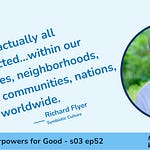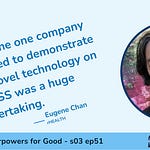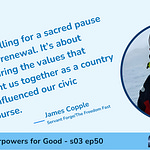Devin: What do you see as your superpower?
Mohan: I'd call my superpower troublemaking.
Mohan Sivaloganathan, known by some as the Batman of social impact, is the CEO of the national nonprofit Our Turn by day and a hip-hop artist and speaker by night.
Our Turn organizes student activists, helping them to find their voices and stories, empowering them to change the systems that constrain or limit their potential.
Mohan shared an example of the work and its impact:
One of our partner organizations brought together dozens of school board members from across the country. It was a community-building space. It was a training space. They were grappling with some of the issues that I already alluded to: the culture wars that are breaking out, the fiscal cliff that is coming soon with the expiration of ESSER funding, the fact that many districts are already dealing with deficits, attendance crises, and the continued mental health epidemic that young people have been dealing with, that increasingly educators and more are dealing with.
So as they were thinking about all these different issues, what I appreciate is that many folks recognize, “Hey, we need to make sure we are directly hearing from students as as a part of this.”
And so they reached out to us and said, “Hey, can you have some student leaders from Our Turn come and present at this convening?” We said, “All right, great.” We had to get together travel plans, a presentation and a curriculum quickly and try to figure out how it could work within the context of what school board members were thinking about.
So the lens that was applied was how do you do authentic student engagement, equity-centered student engagement within the context of budgeting? And how can you think about participatory budgeting in a unique way?
Our students doing what they do; they absolutely knocked it out of the park. They pulled back the curtain. They delivered this wake-up call and a call to action to the folks who were in this breakout session. So it was a breakout session featuring student leaders.
They talked about how young people want to be engaged and involved. Here are some of the pros and cons in that process. Here's how it can work within the context of participatory budgeting. So it was something that was very actionable. It wasn't just hypothetical and values-based, but it was something that was very actionable.
Fast forward to the end of the conference, where the organizers were bringing everybody back together into the main hall. People had engaged in all sorts of learning, including our session and others. The organizers stood on the main stage and announced, “Hey, we had student leaders from Our Turn who were in a breakout session, and it was amazing. Next year, they're going to be right here on the main stage.”
That was recognition that everybody had who happened to be in that small room with students, that young people deserve the microphone, that in this time where there is such deep polarization and division, animosity, cynicism, you name it, within our culture in the US and within schools, they are the group of folks who are the best positioned to lead a more hopeful and aspirational vision.
Mohan attributes his success in building the organization to his ability to stir up what the late civil rights giant John Lewis called “good trouble.”
AI Episode Summary
Devin Thorpe interviews Mohan Sivaloganathan, CEO of Our Turn, on the Superpowers for Good show.
Mohan is a social justice advocate working towards changing education and empowering students.
Our Turn aims to help students discover their agency to shape their future and create a just and thriving education system.
The organization trains young people to be effective storytellers, advocates, and changemakers.
They tell the stories of young people to understand their experiences and aspirations for the future.
Our Turn turns the tables on decision-making by helping young people shape their own efforts and campaigns to bring about tangible changes in the education system.
Mohan provides an example of student leaders presenting at a school board conference to discuss authentic student engagement and participatory budgeting.
The organization focuses on individualizing education and breaking away from the one-size-fits-all approach.
Mohan identifies his superpower as "troublemaking" and emphasizes the need to shake the status quo through voices, action, and culture.
He shares an example of using his troublemaking superpower to inspire and motivate leaders after the 2016 presidential election.
How to Develop Making Good Trouble As a Superpower
Mohan’s goal to make good trouble extends beyond his work at Our Turn and includes his speaking and performing. He shared an example of how he used his superpower immediately following the 2016 presidential election, leaving many in his community feeling disappointed–or worse.
In November 2016, I was invited to an event that had 100 plus young next-gen emerging leaders who were working across the corporate sector and nonprofits. I was invited to come to this convening in DC and to speak and perform. This was about one week after the election—the US presidential election in 2016. Literally, as soon as I walked into this room, it was it was just it was dark. You could feel it. It was somber. There was this really tense, thick emotion that was that was in the air. I was in that room; I was feeling that, too.
I was feeling disappointed. A few days before, I had people in my office at work. At the time, I was working in Human Services in New York. Folks were crying. Folks were literally crying in my office. This was a tough place for people to be able to navigate out of.
So, I revised the remarks that I was planning, literally right there as I was in the room. I go onto stage, and I start with a performance of a song called “Our Time.” I performed the song and then, from there, delivered some remarks to the audience.
The theme that I tried to share with people is that it's moments like this are why we're here. It's why we decided to take on a purpose-oriented field of work. It's why we've shaped our leadership in a certain way. It's why we've built this type of community. Yes, we're holding disappointment and sadness, and we need to try and find the fuel, the energy, the motivation to be able to still charge forward and to recognize this is indeed our time. This is our place, our moment. This is where we're supposed to be. This is a time to agitate more than you ever thought—not to fall back and to feel like, hey, it's not my moment anymore.
But no, actually, this is your space. This is your lane; this is my space and lane. Let's go out and be louder and bolder than ever. I went off the stage afterwards and talked with a few folks. Multiple people came up and said, “Hey, look, I was thinking about literally leaving this field of work. I was thinking about leaving the nonprofit space, leaving this purpose orientation. I think it was going to be for me anymore. But I found the fire again. thank you.
By heeding Mohan’s message and following his advice, you can make good trouble a skill you add to your quiver. With practice, it could become your superpower, enabling you to do more good in the world.
Guest-Provided Profile
Mohan Sivaloganathan (he/him):
CEO, Our Turn
About Our Turn: Our Turn is a revolutionary, youth-led movement dismantling oppressive structures that limit access to quality education. We activate young people of color and allies to ignite change and catalyze a national movement to heal and liberate current and future generations of students.
Website: itsourturn.org
Biographical Information: Mohan Sivaloganathan is the Batman of Social Impact, as a nonprofit leader by day and hip-hop artist by night. In his Bruce Wayne world, Mohan serves as the CEO of Our Turn, the nation's leading movement of students fighting for education justice. As the Dark Knight, Mohan assumes the alias of Ahmen and uses the power of music to spark changemaking. Above all, Mohan is a father, husband, son, brother, friend, and Troublemaker for the status quo. Mohan has partnered with young people, professionals, and organizations to advance transformative change in the arenas of education, justice reform, mental health, civic engagement, and more. On the mic, he has delivered performances and talks in partnership with the World Economic Forum, Stanford Social Innovation Review, Net Impact, NYU, Penn State, the University of San Diego, Independent Sector, Fordham, Synergos Institute, Centre for Social Innovation, Defy Ventures, the World in Conversation Project, and many more. Mohan was awarded as a “40 Under 40 Rising Star” by New York Nonprofit Media and a “Next Generation Leader” by the Human Services Council and was featured in Good is the New Cool, an Amazon Philanthropy & Charity #1 new release.
Linkedin: linkedin.com/in/msivaloganathan/
For the September SuperCrowdHour, I’m going to share some of the lessons I’ve learned from making dozens of crowdfunding investments and talking to hundreds of entrepreneurs and investors. You’ll learn not just how to make investments via crowdfunding but how to make money doing it.
Many impact crowdfunding investors focus on impact first. I admire the approach but note that a goal for maximizing impact is best accomplished by making money. It works two ways. A company that goes out of business has no impact after it dies. One that grows profitably can do unlimited amounts of good. Furthermore, if the investment delivers financial results to you, you can reinvest and do more good as an investor!
If you’re focused primarily on making money, you’ll find this session helpful, too. We’ll discuss maximizing financial returns. Don’t miss it!

















